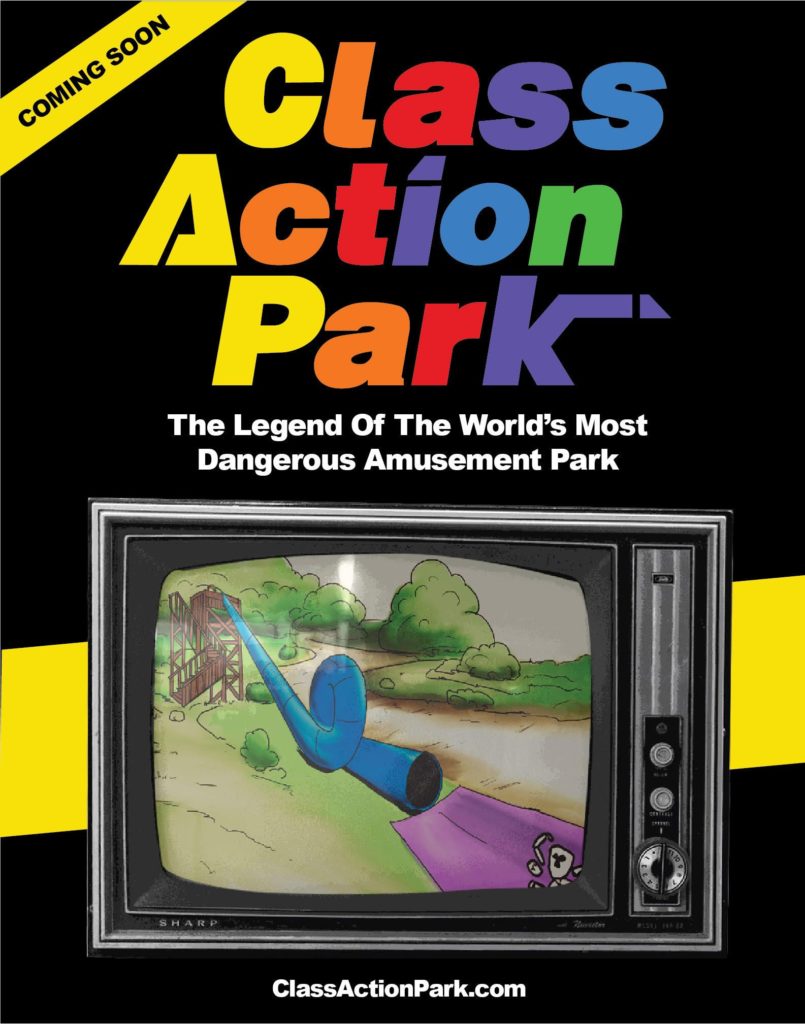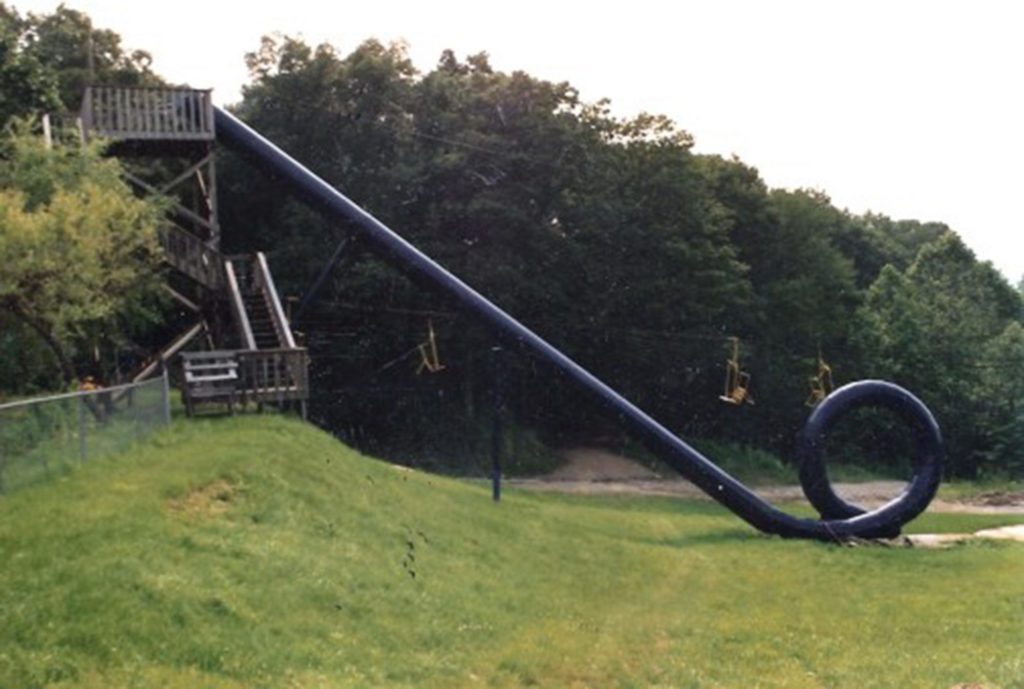
One of the oddest, most persistent points of generational pride is how dangerous one’s childhood was. If you drive past a modern playground with a baby boomer, gen-Xer, or even some elder millennials, there’s a good chance they’ll beam about how their playgrounds were made out of concrete and steel, and how kids today are coddled by all the precautions added for their safety (I’m not sure to what extent the Greatest Generation did this, but I suspect the game gets less fun when one’s childhood included the great depression, the dust bowl, and the holocaust). Most of the time, of course, these stories are bluster– they all lived to tell the tale, after all– but every once in a while, you’ll think back on something from your childhood and think, “Wow, that was actually really fucking dangerous.”
Such was the case with Action Park, the notorious water park which terrorized and delighted the youth of Vernon, New Jersey for two decades. Created as a summertime adjunct to a skiing resort, Action Park presaged the more-is-more aesthetic of Six Flags’ roller coasters, offering waterslides with massive loop-de-loops and near-vertical plunges. Unlike today’s amusement parks, however, Action Park was built with a less-than-perfect grasp of engineering or regard for human life, and many of these death-defying attractions failed to live up to the “defying” part. Regardless, the park was both wildly popular and improbably long-lived, and, as we learn from the interview subjects in the terrifically entertaining new documentary Class Action Park, built a complicated, near-mythical reputation among the children of Jersey.
Action Park was the brainchild of one Gene Mulvihill, a would-be proto-Gordon Gekko who was exiled from Wall Street following a transparently fraudulent penny-stock scheme. Undeterred, Mulvihill moved his operation to Vernon Township, home of New Jersey’s Playboy Club, where he purchased and combined two neighboring ski resorts. Realizing ski tickets would only line his pockets for half of the year, Mulvihill outfitted half the mountain with swimming pools, fantastical slides, and go-kart tracks, making Action Park one of the country’s first “water parks.” Mulvihill, it should be noted, was a grifter first, entertainer second, and “person who should be designing potentially dangerous rides” far, far down on the list; in interviews with former employees, the larger-than-life entrepreneur comes off as something of a cross between Tony Soprano and Fred Willard’s character from Best in Show. Nevertheless, Mulvihill personally sketched most of the park’s slides (often on cocktail napkins), and, for better or for worse, they were brought to fruition and opened to the public.
Much of the documentary is structured as a sort of guided tour through the park, illustrated via home video footage, intentionally crude animation, and interviews with former staffers and surviving patrons (including Chris Gethard and Alisson Becker); we also get to see some vintage Water Country-esque ads and location footage from MTV’s Headbanger’s Ball, with Riki Rachtman interviewing noted bad-decision-makers Layne Staley and Jerry Cantrell at the park. Each ride more or less functions as its own self-contained, real-life Aristocrats joke: it starts with a premise that makes you think, “that can’t possibly be safe”; it goes on to prove that it is, indeed, unsafe for all the immediately obvious reasons; it reveals a handful of additional hazards that you never would have even thought of (one slide, in addition to causing lacerations and dislocated shoulders, had an active beehive inside it); and, finally, we hear horror stories about the inevitable injuries that ensued. The mental image of employees cleaning out the teeth embedded in the park’s signature Cannonball Loop will stay with me for a long, long time.
It’s conceivable, of course, that the dangers of such a park could be contained through highly trained staff and constant safety supervision. That, uh, wasn’t the case. Mulvihill staffed Action Park with whatever local teens needed summer jobs, and essentially left them to their own devices to run the park and enforce whatever rules they felt like. The culture, as described by one one-time manger, was “Ayn Rand meets Lord of the Flies”; staffers were constantly getting high, having sex, daring each other to break the rules they were supposed to be enforcing, and sweeping injuries under the rug to avoid getting into trouble. The result was one of the few “family” thrill destinations that truly lived up– and down– to its reputation.
Much of Class Action Park is spent with its interview subjects, who regale the camera with tales of their experiences with the park. The consensus, of course, is that Action Park was fucking insane, and that it was equally insane that anyone willingly let their children go there (Gethard recalls that his parents refused to take him, and only relented when he was invited by a friend). Unlike most childhood nostalgia, in which things we took for granted are suddenly revealed to have dark undertones, it’s clear that everybody knew exactly how crazy Action Park was; rather, the revelation is the fact that so many adults let this happen. The tone of most of the interviews is hysterical, punctuating one insane story after another with “How did we not die?!”
Of course, people did die– lots of them– flung from slides, drowned in the abnormally aggressive wave pool, electrocuted by the underwater fans in the otherwise-relaxing kayak ride. In one harrowing stretch toward the end, we meet the family of a 19-year-old athlete who was killed on the Alpine Slide, a patently insane attraction which sent park-goers careening down a concrete slide on a tiny wooden sled amidst jagged rock embankments. Their story is heartbreaking and, in the context of the film, it feels like the beginning of the end of the park. Then you realize: this happened in 1980, two years into the park’s existence. How in the name of Ralph Nader was this establishment allowed to exist?
The answer, as it so often is, seems to boil down to money and corruption. Mulvihill, for all his PT Barnum eccentricity, was clearly a scumbag, a white-collar criminal with possible mob ties who valued his own business over human lives (tellingly, Mulvihill was friends with Donald Trump, who backed out of investing in Action Park because it was too crazy even for him). He “insured” the park via a Cayman Islands front organization and refused to settle any lawsuits, forcing the plaintiffs into trials he knew they couldn’t afford. What’s more, for all its obvious flaws, people loved Action Park, making it the cornerstone of Vernon’s economy. Shutting it down would cost a lot of people a lot of money– isn’t a robust economy worth a few preventable deaths? There’s probably an analogy somewhere in here to be drawn to current events. Give me a second– it’ll come to me.
With its glossy sheen and charismatic talking heads, Class Action Park shares an aesthetic with the current vogue of bingeable true-crime entertainment, and one can easily envision it padded out to miniseries length. Thankfully, directors Chris Charles Scott and Seth Porges opt against Serial-izing their story, instead turning it into a sort of roundtable discussion of a single crazy, shared experience. Substance-wise, it probably could have gone deeper (I would have liked to have seen a deeper investigation of Mulvihill’s criminal ties), and it occasionally tries to have it both ways as a celebration of the carefree ‘80s and an indictment of a truly horrible failure of safety standards. But as Gethard muses towards the film’s end, sometimes it can be both; you can laugh about your fucked up childhood experiences with your friends, then cry about those same experiences to your therapist, and both reactions are valid. In the end, Class Action Park is horribly entertaining, and will have you laughing and gasping in the very same breath. It’s the rare piece of entertainment that will make you glad you can’t get out and enjoy the summer.
Class Action Park
2020
dir. Chris Charles Scott & Seth Porges
106 min.
International Premiere at the Fantasia International Film Festival – Follow our continuing coverage here!
Available to stream on HBO Max Thursday, 8/27
Streaming is no substitute for taking in a screening at a locally owned cinema, and right now Boston’s most beloved theaters need your help to survive. If you have the means, the Hassle strongly recommends making a donation, purchasing a gift card, or becoming a member at the Brattle Theatre, Coolidge Corner Theatre, and/or the Somerville Theatre. Keep film alive, y’all.


